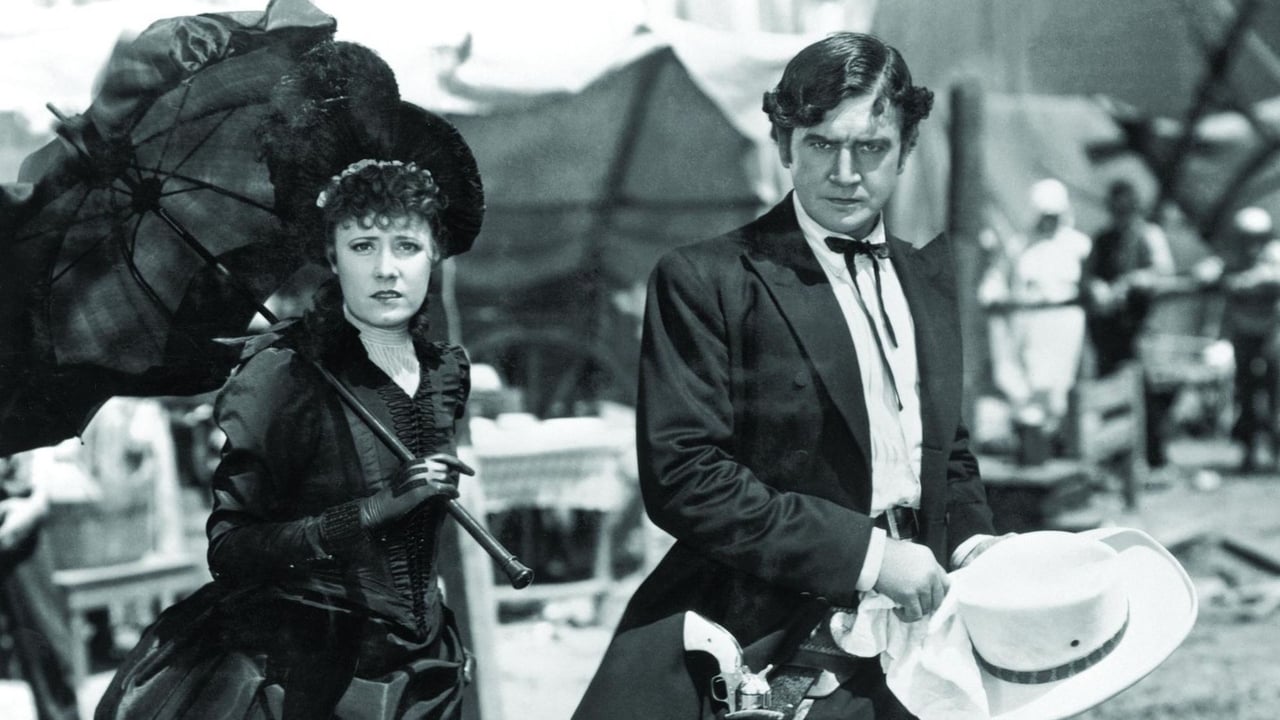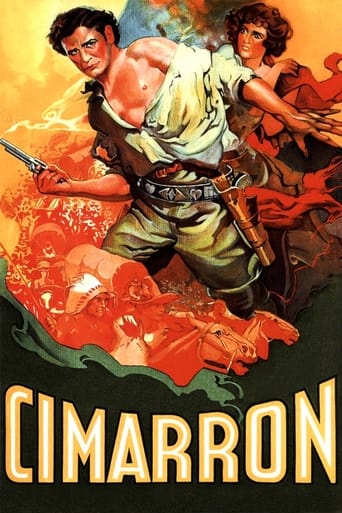

The acting is good, and the firecracker script has some excellent ideas.
... View MoreThe plot isn't so bad, but the pace of storytelling is too slow which makes people bored. Certain moments are so obvious and unnecessary for the main plot. I would've fast-forwarded those moments if it was an online streaming. The ending looks like implying a sequel, not sure if this movie will get one
... View MoreExcellent and certainly provocative... If nothing else, the film is a real conversation starter.
... View MoreThis movie tries so hard to be funny, yet it falls flat every time. Just another example of recycled ideas repackaged with women in an attempt to appeal to a certain audience.
... View MoreA newspaper editor settles in an Oklahoma boom town with his reluctant wife at the end of the nineteenth century.This film is something of an anomaly. Starting from an Edna Ferber novel, it was made into a western epic and was highly praised. The film received a ton of Oscar nominations, and even won Best Picture. The last western to do so until 1990's "Dances With Wolves" sixty years later. You would think it would be a massively powerful film.And yet, it has fallen hard. As of 2015, it is the lowest rated Best Picture on IMDb, with only a 6.0 rating. The rating is fair, but it means either this is the worst Best Picture ever made, or it was up against even worse films, or something...Not helping matters is the film's apparent rarity. It saw DVD release about a decade later than it should have, and as of 2015 still does not exist on Blu-ray. Nothing can be done for the story and acting, but it looks like the picture could be cleaned up some.
... View MoreUpon hearing a disagreeable melody, one might wonder whether one was hearing a good song sung poorly or a bad song sung well. I had a similar reaction in watching this movie with regard to the character Yancey Cravat: Is this an admirable character portrayed by a bad actor, or a despicable character excellently portrayed? By the time the movie was over, I had concluded that it was the worst of both worlds. Richard Dix gives a hammy performance of an insufferable jerk.This would not be so bad if the movie wanted us to regard Yancey as a jerk, and Richard Dix merely overacted the part as if he were performing on stage, where a loud resonating voice and sweeping gestures are needed for the benefit of those sitting in the back rows. But the movie goes to great lengths to get us to admire Yancey, and the dissonance between what the movie expects of us and what we are actually feeling as we behold this preposterous character is grating.Irene Dunne, by way of contrast, does a decent job of playing Sabra, Yancey's wife, whom we sympathize with for all she has to put up with, even though the movie really does not want us to like her very much, because it is continually showing her as lacking the virtues that Yancey possesses. For example, Sabra is a racist who despises Indians, while Yancey is respectful of Indians and regrets the way they have been treated by white men (there is the suggestion that he is part Indian himself, but whether Sabra knows this is not clear). Also, Sabra is a heartless prude, who wants to run Dixie Lee out of town for being a public nuisance (i.e., a prostitute), while Yancey realizes that Dixie is "more to be pitied than censured," and successfully defends her in court against the legal action brought against her by Sabra. And when Yancey deserts Sabra and the two children so that he can have some fun pioneering again, the movie practically wants us to think it is her fault for not being willing to go with him. Of course, we are eventually allowed to like her once she finally realizes that Yancey has been right and she has been wrong.Underscoring all this are their children. Their daughter is a shrew, while their son is such a nice guy he even intends to marry an Indian. But why stop there? The whole town is like that. With the exception of a few scoundrels, the men are genuine and likable, while the decent women of the community are snobs and prudes. It is hard to believe this movie was based on a novel written by a woman.When Yancey abandons Sabra again, the movie sees no need to belabor his second desertion of her, but merely mentions it in an intertitle. Many years go by, during which time Sabra becomes a United States representative, her reward, presumably, for finally realizing how enlightened her husband had been all along. At a political banquet in her honor, she gives credit to the contribution women have made in civilizing Oklahoma. Given all the misogyny we have seen up to this point, this belated tribute to women almost sounds like an apologetic afterthought.Sabra barely manages to fight back the tears as she tries to tell herself that Yancey is still alive somewhere. But then it turns out that some old roughneck working on an oil rig right nearby has been severely injured because he used his body to shield the rest of the crew from some exploding nitroglycerin, and Sabra, hearing that the man's name is Yancey, rushes to him, where he dies in her arms while blathering about what a loving wife and mother she is. Of course, we cannot help but think that even though he was working right there in the local oil fields, he apparently did not want to have anything to do with her, because he never even let her know he was in town.And then the cover is removed from an obscenely huge statue of Yancey in honor of the pioneers who made Oklahoma what it is. There is another figure, somewhat smaller in stature, standing behind him, but it is not Sabra. It is an Indian. A male Indian, of course.
... View MoreThis movie is easily the worst Best Picture Oscar winner. It won in 1931, and I'm not sure why. Maybe because it was a talkie, and talking pictures were still fairly novel. Maybe because of how epic its historic time scale is. Maybe because it tells a story of the exploration and settlement of America that sparked something in 1930s audiences.Who knows. All I can say is that by modern standards it is incredibly bad.This is not because of the cinematic technology or anything like that. It has a dull story with hammy acting. Worst of all, it is blatantly racist. The black kid is merely there as a figure of fun, something to be made mocked and made fun of. Interesting that while large parts of the movie are very politically correct in the treatment and rights of native Americans, they undo all this good by portraying African-Americans so badly.I had already watched the 1960 remake before watching this, and that wasn't that great either. It retained the dull plot and hammy acting, but at least reduced the bigotry. I didn't realise the original could be that much worse, but it is...
... View MoreAdventuresome and scholarly Richard Dix (as Yancey Cravat) joins the 1889 Oklahoma land rush, and helps settle the territory, with loyal homesteading wife Irene Dunne (as Sabra). His oratory skills as a lawyer and work as a newspaper editor help Mr. Dix defend the downtrodden through the ensuing decades. Notably, Mr. Dix is supportive of Native American (Indian) rights. Dix also helps independent woman and presumed prostitute Estelle Taylor (as Dixie Lee). After some decades pass, we meet the title character, wild and unruly son Don Dillaway (as Cimarron "Cim" Cravat)."Cimarron" is mostly recalled as the first western to win an "Academy Award" for best film. Some may think it should be recalled as the first time an award was given to prop up the box office of a flop. But, the red ink was due to RKO spending so much on the film; while not recouping its cost, "Cimarron" was one of the biggest box office hits of 1931. It was also a triple crown "Best Picture" award winner, with prizes from "Photoplay" and "Film Daily" included. Those awards were also the ones bestowed upon "The Covered Wagon" (1923), which was the world's previous western standard.None of this means "Cimarron" is anything more than a swaggeringly average western, with a lot of production cost. Some of it is so dull, the "ethnic" characters emerge as most perversely entertaining. It's difficult to justify the acting nominations for Dix and Ms. Dunne. Director Wesley Ruggles manages the crowds well and adds a few artful moments, like the clever crucifying positioning of Jewish character George E. Stone (as Sol Levy), after some bullying. Edna May Oliver (as Tracy Wyatt) also makes the most of her role, employing many mannerisms seen later in Carol Burnett.***** Cimarron (1/26/31) Wesley Ruggles ~ Richard Dix, Irene Dunne, Estelle Taylor, George E. Stone
... View More